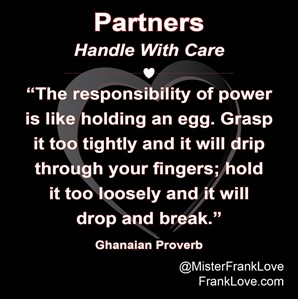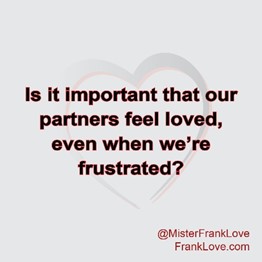 In my last post, the charge for each of us was to keep in mind the tremendous impact we can have on our partners as we move through our days, weeks, months, and years. We pondered the question, “What or who is more worthy of our time and energy than our partners?” Let’s continue the conversation by looking at another side of the issue. How can we respond when our partners do not seem to be as supportive as we wish?
In my last post, the charge for each of us was to keep in mind the tremendous impact we can have on our partners as we move through our days, weeks, months, and years. We pondered the question, “What or who is more worthy of our time and energy than our partners?” Let’s continue the conversation by looking at another side of the issue. How can we respond when our partners do not seem to be as supportive as we wish?
Motivation and ambition can be great assets and characteristics. And for many of us, when we are driven, we naturally want our partners’ support. We may want their physical labor or talents. Or we may simply want their emotional support—”Go get ’em babe.” And as discussed in the previous blog, we may feel bothered by their perceived disinterest. This fragile situation requires careful handling.
All of us have power in our relationships that can be wielded in different ways. As we do so, it is important that we do not hurt, reject, or guilt our partners when we do not believe that we are getting the level of support that we want. A Ghanaian proverb says, “The responsibility of power is like holding an egg. Grasp it too tightly and it will drip through your fingers; hold it too loosely and it will drop and break.” We are well-served when we conduct ourselves with similar care as we deal with, work with, and live with our partners.
Jordan and River have been married for eight years. Jordon owns a car wash. The business is flourishing and netting over $15,000 a month. However, there are challenges. The business experiences excessive staffing turnover, and Jordan cannot figure out why. There is residual impact at home as Jordan must work longer hours and additional days to fill in whenever there are staffing shortages.
River isn’t happy and displays an irritation with Jordan’s business and how it is run with comments such as, “You’re never home” and “Your employees see you more than I do.” The situation worsens when Jordan plans to be home and promises River such, but encounters a delay at the last moment and is late. One day things escalate when, after being on the uncomfortable end of one of River’s comments, Jordan says, “You know, you could help me. You could help me figure out what my turnover problem is. You could even come to the business and hang out with me. Or you could help with something else so that I could do a better job addressing the turnover problem.”
“I’m not helping at a car wash,” River responds and walks away.
While River has responded initially with a level of disinterest, a feeling of personal guilt emerges. Am I a good partner? Does Jordan think I’m a good partner? River’s mind is racing; self-doubt and feelings of despair take hold as River thinks, Maybe I’m being unreasonable and selfish, but I don’t know how to change that. I don’t want to change that. But I still want Jordan to feel and believe that I am loving.
This is an interesting situation because now there are two frustrated and hurt individuals. Jordan is bothered by business frustrations, pressure from home, and thoughts of what River may do next out of anger or frustration. River is frustrated by having a partner who is not around as much as preferred and by an inability address Jordan’s pain and struggles in a healthy manner. It’s a mess . . . and it is also very common.
This illustrates why we must work to take care of each other at all times. We want our partners whole. We want them to feel good about themselves, and we want them to simply feel good. On top of that, running a business, or any initiative, is a big responsibility; it requires us to open our minds, examine our perceptions of how other people may (or may not) be able and willing to help, and offer our prayers (if we believe in that sort of thing) for guidance where we are simply lost. Let’s consider how Jordan could deal with this situation with greater care.
With foresight, Jordan can actually plan to protect River from the loneliness that may ensue due to working late. Jordan can also protect River from feeling guilty, unreasonable, or burdensome for demanding time. These protections come with a high degree of intentionality. Jordan may be able to develop (possibly through this blog) an awareness of some of the challenges that ensue when pursuing an initiative, such as running a business.
With care as a guide, let’s get ahead of these issues by keeping them in the forefront of our consciousness.
-
 Let’s talk to our partners as we create our hours, revenue projections, and staffing plans. Their support and potential buy-in can be quite helpful. And also keep in mind, that our partners might not care about our business challenges and plans. That can be OK too.
Let’s talk to our partners as we create our hours, revenue projections, and staffing plans. Their support and potential buy-in can be quite helpful. And also keep in mind, that our partners might not care about our business challenges and plans. That can be OK too.
-
Let’s adhere to our plans. Work will always be there. The business will always want more of our time and energy. Let’s go home anyway, just as planned and honor our commitment to our partners. We can also demonstrate integrity to ourselves.
-
Let’s work to support our partners, even when we don’t feel like we’re getting the support we’d like from them. Set the example. Create the relationship culture that says “We are committed to being loving to one another even when we are challenged.”
Disinterest is not simply happening in a vacuum. Disinterest has history. It has roots. Let’s look for the meaning behind the perceived disinterest. Perhaps all that our partners want are the very basics—no luxury, no savings, no aspirations of wealth. If this is the case, they have reasons for these positions or beliefs. Make a space for this perspective. If there is something our partners want to change about themselves, let’s discuss how we can be of support. But most importantly, make sure they feel loved no matter what they do.
Each of us are fragile in our own way(s). We want to feel supported, and we want to feel loved. Let’s do all that we can to support that feeling in our partners, even when we are frustrated.
If it seems like River is getting off the hook, read last week’s blog again. Both parties can turn the tide, use this situation and create a beautiful conversations that leads to a meaningful understanding.
Keep Rising,
Frank Love
In my next blog post, “Table Manners,” I will discuss some helpful guidelines for pausing a disagreement in a loving relationship.
Watch Frank Love’s presentation “The Act of Caring.”
Subscribe to receive Frank’s weekly blog.
Become a sponsor of Frank Love and his work creating loving cultures in our relationships with a monthly contribution of as little as $2. Sign up today at Patreon.com/FrankLove.
–—–—–—–—–—–—–—–—–—–—–—–—–—–—–—–—––
Each week, Frank Love hosts Zoom support group meetings that assist women and men as we work to create a loving culture in our relationships. Calls occur from 7 p.m. to 8:30 p.m. EST and can be accessed by visiting FrankWeeklyCall.com.
- Tuesdays—Black Women: Creating a Loving Culture in Our Relationships
- Thursdays—Black Men: Creating a Loving Culture in Our Relationships
–—–—–—–—–—–—–—–—–—–—–—–—–—–—–—–—– –
Frank Love coaches individuals toward creating a loving culture in their family. He is also the author of Relationship Conversations You Don’t Want to Have (But Should Anyway) and 25 Ways to Be Loving. To schedule a free consultation, contact Frank at Frank@FrankLove.com.

